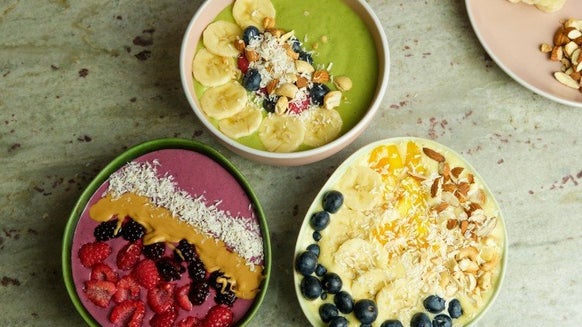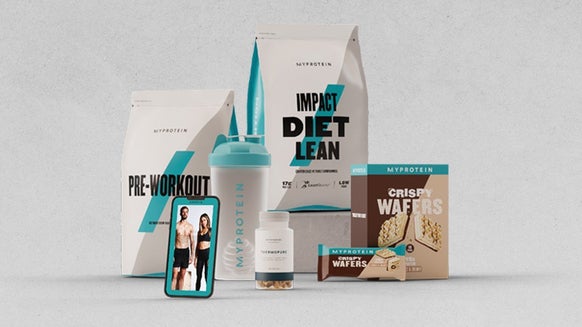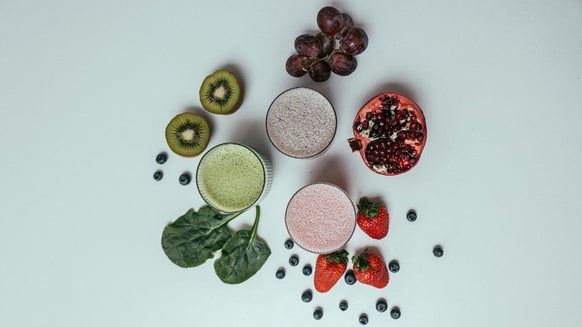5 Foods High In Vitamin D

Some of you may have heard of the “sunshine vitamin” … well, that’s our good friend vitamin D. Vitamin D is a fat-soluble vitamin, meaning that we absorb and retain it better alongside a serving of dietary fat and we can also store it in our body for long periods of time. Lucky for anyone living in the UK, this vitamin isn't just found in the sunshine, there are also foods high in vitamin D.
But why is it known as the “sunshine vitamin”? Well, when our skin is exposed to ultraviolet light (most often from the sun), the proves of vitamin D synthesis is triggered.
This is why in darker months when we are indoors more often, and have less exposure to sunlight, it is important to get vitamin D from our diet and supplementation.

But why should we care about vitamin D?
Vitamin D is one of the most important components in our diet, yet recent research has found that as many as one in five UK residents are found to be deficient in it1.
Vitamin D has a diverse range of functions in the body, aiding and benefitting both our mental and physical health. It’s best known for helping to regulate calcium (through its effect on absorption and reabsorption).
Studies have also found vitamin D to be an important consideration for athletes and exercisers, with supplementation of the vitamin helping to improve both resistance and cardiovascular exercise performance and recovery3.
While one in five UK residents may seem like a lot, it's perhaps even more surprising that research shows more than half of athletes appear to have a vitamin D deficiency4.
OK, so how do we make sure we’re getting enough vitamin D when we need it?
Let's start with food sources. Here are five of the best food sources of vitamin D if you're looking to boost your intake.
5 of the best food sources of vitamin D
Cod liver oil
Everyone’s favourite — fish oil, specifically, cod liver oil. I hope I wasn’t the only one who experienced the tablespoon of cod liver oil when I went to visit my Gran’s every Saturday?
Well, it turns out Gran science is pretty reliable, as cod liver oil is the greatest non-supplement dietary source of vitamin D (I know some of you will say it is a supplement, but it’s kind of not — it’s a bit like protein powder in that sense).
A tablespoon of cod liver oil provides up to 35μg (micrograms), which is incredible considering the recommended daily allowance (RDA) is currently just 10μg5.
Cod liver oil is also packed with omega 3, which are believed to support the health of our brains as well as our hearts6,7.
Salmon and Trout
You’re more than likely familiar with salmon, but trout’s another great option… maybe you don’t eat it that often, but you should.
Both are great sources of vitamin D (netting you between 14-17μg per 100g serving) and are packed full of high-quality protein.
Similar to cod liver oil, you can also expect a good serving of omega 3s (with salmon being a particularly good source). The two fish are also brimming with vitamin B12, an incredibly important vitamin that supports the formation of DNA, healthy red blood cells and critical components of our central nervous system.
Salmon is also high in omega-3s as well as vitamin D.
Mushrooms
Do you have “mushroom” on your plate for an extra serving of … mushrooms? You may want to make some when you find out that mushrooms (at least those exposed to direct sunlight) can provide as much as 10μg of vitamin D per 50g serving. Great news for those following a plant-based diet.
Mushrooms also contain some plant protein (not a huge amount) as well as some fibre. They’re a particularly good food to include for those who love more volume in their meals, helping you to feel fuller.
Mushrooms are also a source of phytochemicals, which are unique compounds found only in plants. In terms of what they can do for us, phytochemicals may help support our immune system and protect cells from harm. Another reason to include more plants in your diet.
Here's a great way to get more mushrooms into your week...
Vegan Fajitas | 15-Minute Ultimate Portobello Fajitas
We've got plant-based power all wrapped up.
Eggs (whole)
These protein powerhouses are also a decent source of vitamin D, providing between 1-1.5μg per egg. A few here and there will certainly help you reach your required intake more readily.
Side note: does anyone else think it’s weird that the yolks look kind of like the sun and that’s where the vitamin D is stored? Just me? OK.
Eggs are also a great source of vitamin B12 as well as monounsaturated fats. This form of dietary fat is what’s described as a “healthier” fat, which can support a healthier heart when replacing unhealthy fats in the diet.
Speaking of healthy fats...
Fortified foods and plant-based milks
The amount of vitamin D found in fortified foods and plant-based milks varies, but you can expect most to offer between 2-4μg per serving.
These foods and milks are also typically fortified with many other vitamins and minerals. It’s recommended to include fortified foods and liquids where you can ensure you’re meeting your daily dietary requirements.
A nod to supplementation
While we can achieve our required intake of vitamin D with whole foods, it may be a lot simpler (and more efficient) to incorporate a supplement. We've got a range of vitamin D for you to choose from to find the right supplement for you.
Supplements should be to your diet what the safety net is a to a trapeze artist you may not always need it, but you’ll always be glad it’s there to keep you covered and safe.
There are vegan options too!
Take home message
Vitamin D plays a diverse and incredibly important role in both our mental and physical health. It may also be a critical component to both exercise performance and recovery.
The primary source of vitamin D is from our skin’s exposure to ultraviolet rays, typically the sun. But there are times of the year where our exposure is much reduced, and we’re staying indoors more than is good for us.
So oily fish, certain plants and plant-based milks, eggs and other fortified foods are all great sources of vitamin D — as well as other healthful nutrients, vitamins and minerals — for when we otherwise struggle to get enough of it.
A supplement may be worth considering for the added element of security, knowing you’re achieving your required intake consistently, effectively and efficiently.








